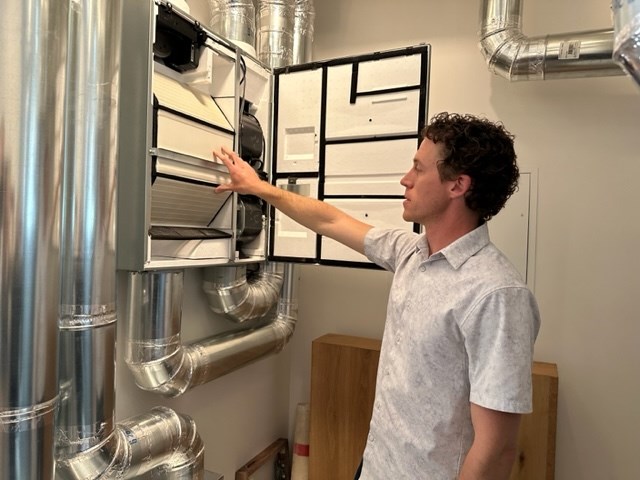With threats of the Canadian wildfires reaching the Valley, the recent Diamond Fire in Scottsdale, Bullet Fire in Fountain Hills, mulch fires in the East Valley and the growing concern of our air quality, it’s evident that something needs to be done.
Phoenix home builder Vali Homes has found a solution to ensure the place we spend the most time, our homes, always has the highest quality of air to optimize our health.
Based on data from over 10,000 buildings, Vali Homes focuses on five factors of a good building: comfort and health; efficiency and renewables; durability and resilience; social equity and embodied injustice; lifecycle carbon impact (embodied carbon - operational savings over time).
The local company has been around for about a decade.
“My original motivation was that I wanted to go into healthcare. I wanted to focus on preventative care somehow, and there weren’t a lot of great paths for that,” said Austin Trautman, founder of Vali Homes. “We realized buildings in general, but especially housing, which is the place you spend a lot of time in, didn't really match that well with health and wellness as well as climate change and our carbon impact…that was the start of the exploration.”
With built-in CO2 meters, your sophisticated air filtration system will automatically sense unhealthy contaminants in the air and clean it to reduce dust and pollen. The Loxone adjusts for temperature, humidity, chemicals and more.
For them, they’re looking for holistically the best approach. As they state on their website, “when others are building ‘green’ homes at the equivalent of a Prius with a flat tire we have been focused on building, testing and improving the next generation Tesla.”
Although they’ve been doing consultant work across the West Coast, the Southwest has been their main focus. They want to be the guides of building better in the Southwest.
“The ironic thing is that if you solve for energy efficiency first, the other four factors that we focus on become pretty mediocre, whereas if you focus on the others first, you get even better efficiency and also have much better health, low carbon impact and better social equity for people installing the materials,” Trautman said. “It’s looking at each material and the system as a whole. One of the sayings we use a lot of the time is that ‘the ingredients create the results.’ It’s like the equivalent of trying to cook a really great meal with moldy ingredients, you’re just not going to get there.”
It was in the late '90s when it started becoming evident that on an environmental level things weren’t going down a great path. Efforts were made in trying to make things more energy efficient, but in the long run, other factors like durability, health and wellness, carbon impact, etc. weren't there. That’s why Vali Homes is driven by data that uses scientifically tested principles such as Biophilia, Biomimicry and Passive House, just to name a few.
There are 14 patterns of Biophilic Design that are intended to hone in on the relationship between nature and human biology. Biophilia focuses on our innate connection with nature and through their designs are shown to reduce stress while improving creativity, cognitive function, etc.
By utilizing Biomimicry, Vali Homes looks at inspiration from nature to solve the challenges we face in sustainability. It’s about looking at what already exists and works, and how they can incorporate that in our homes to better our carbon footprint and overall well being.
Their homes are built to be in balance with the Sonoran Desert, inspired by nature and artfully created to deliver year-round comfort and mountain-clean air. Your home should be your escape, a peaceful space away from the hustle and bustle of city life, says Vali Homes, adding that you’re not only investing in your health, but you’re also investing in the future.
“Things are becoming much more unknown, whether it's the cost of utilities, air quality or carbon impact. It’s one thing to prepare for the issues that we know now, but it’s another thing to prepare for future unknowns,” Trautman said. “That’s really our big goal… How can you be more comfortable and more stable in an unpredictable future?”
Vali Homes has been building the Mews community, part of a neighborhood in Uptown Phoenix. Each of the four single-family homes has an overall performance that’s unmatched by 99.9% of all homes on the planet. Residence 1, a three-bedroom, 2,350-square-foot home, and Residence 4, a 2,150-square-foot two-bedroom home with a pool are available. For more information on their listing details, visit valihomes.com/mews.
In looking ahead, Trautman shares that they don’t see themselves building large scale and expensive developments, but instead paving the way for larger companies to see examples of how we could be living and building with their philosophies. They’ll work with designers, already built homes, people looking to build a brand new home, architects and developers of different sizes to try and figure out where they can engage, help, and where their direct knowledge can be most helpful.
“An important point is that this isn’t simple. These are really complicated, larger problems that may have simple answers. We want to help people navigate that,” Trautman said. “Biophilia and Biomimicry are concepts that are good gateways for people. They’re able to make a lot more sense for what we’re doing… nature already had this figured out a few thousand years ago and we need to just not screw it up too much.”
With lower utility and maintenance costs, Vali homeowners can save around $800 a month.
“It’s about how we can actually improve air quality inside of the house while not contributing to the problem. On the most global scale, we need to reduce our carbon impact,” Trautman said. “It really is that EV shift of housing.”
For more information on Vali Homes, visit valihomes.com.



